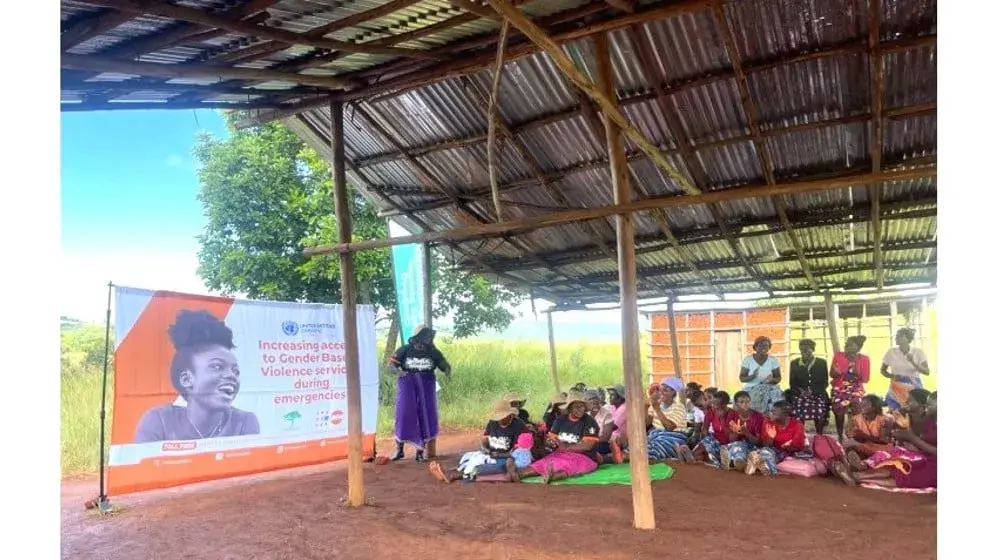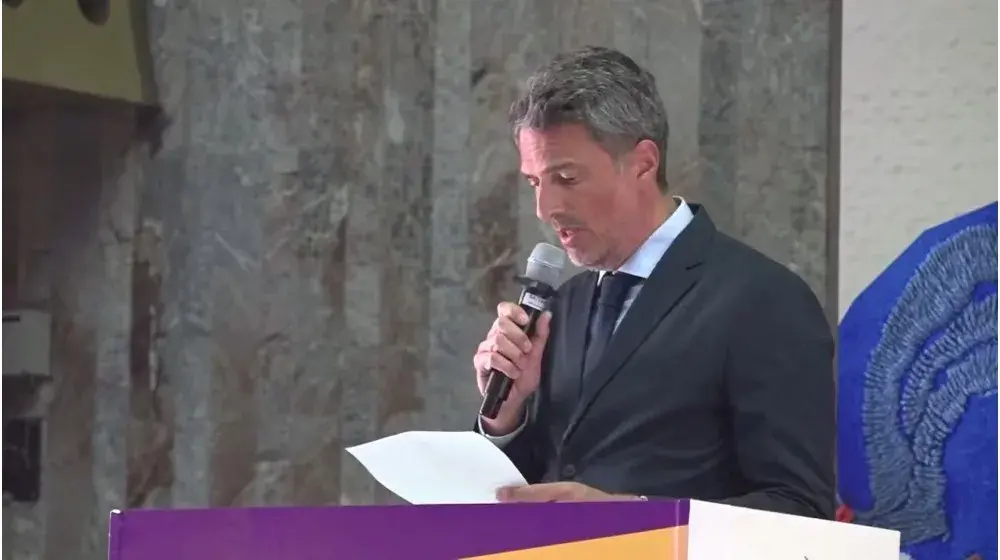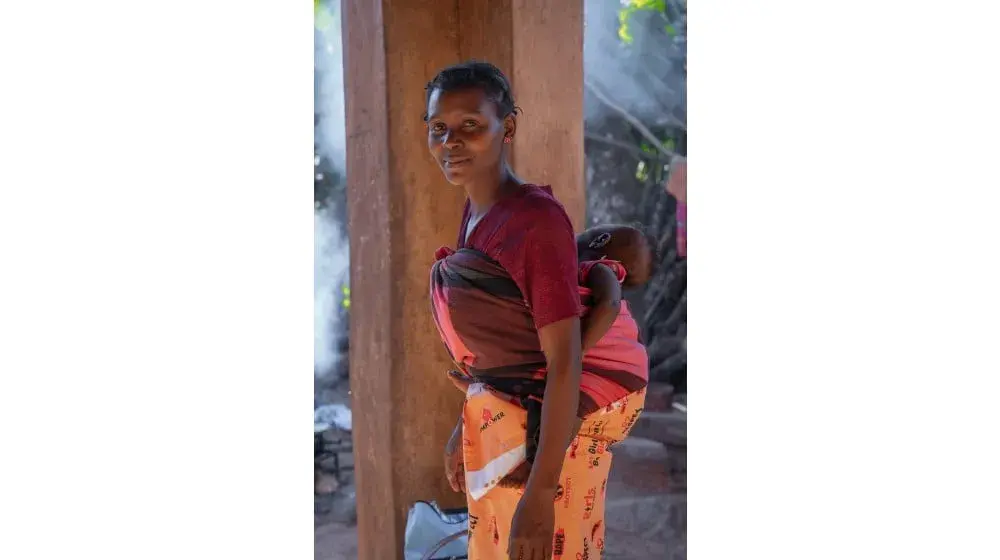Harare, Zimbabwe, 31 May, 2022 – The United Nations Population Fund in May hosted donor missions from the European Union (EU) and the World Bank who visited various programmes on Sexual Reproductive Health and Gender Based Violence being implemented in Zimbabwe.
EU Spotlight high level mission - Epworth
UNFPA, together with other UN agencies (UN Women, UNICEF) supporting the Government of Zimbabwe implement the Spotlight Initiative, hosted a delegation from the EU. The Spotlight Initiative is a United Nations (UN) initiative to eliminate violence against women and girls and harmful practices funded by the EU. The high-level field mission visited various Spotlight Initiative supported interventions in Harare province that included the Epworth Safe market, Epworth Static One Stop Centre and Mobile One Stop Centre, the Harare Magistrates Victim Friendly Court and the Zimbabwe Republic Police Criminal Investigation Department Forensics Laboratory. The delegation was able to witness the positive impact collaboration amongst stakeholders under the Initiative was having to women and girls within the Epworth community.
The objectives of the field mission were to provide an opportunity for the mission to learn of the Spotlight Initiative’s support and ongoing work with stakeholders and partners including Government and communities, and to showcase the Spotlight Initiative support to Women’s Economic Empowerment and Gender Based Violence Response in the selected sites in Harare Province.
The United Nations Resident Coordinator and the EU Ambassador to Zimbabwe, Spotlight Heads of Agencies and Government Representatives were part of this mission. UNFPA as the lead agency on GBV prevention and response within the UN Country Team showcased the Epworth One Stop Centre model – both the static and mobile approaches. The One Stop Centre model seeks to provide survivors with comprehensive essential services (Health, Psychosocial, security and legal) services under one roof.
GBV service availability and accessibility is fragmented in Zimbabwe, with static OSCs and shelters set up mostly at provincial and district level. Not all GBV survivors have the means to access services at the static, hospital-based OSCs. Distance and lack of economic means to reach static services, impedes access to services therefore making it imperative to make GBV services mobile to accommodate those survivors in remote and marginalised areas. To mitigate these challenges, UNFPA introduced the mobile OSC model, which is an adapted version of the static OSC model. This initiative is aimed at ensuring access to GBV essential services in remote and hard to reach areas, in line with the Spotlight Initiative principle of leaving no one behind.
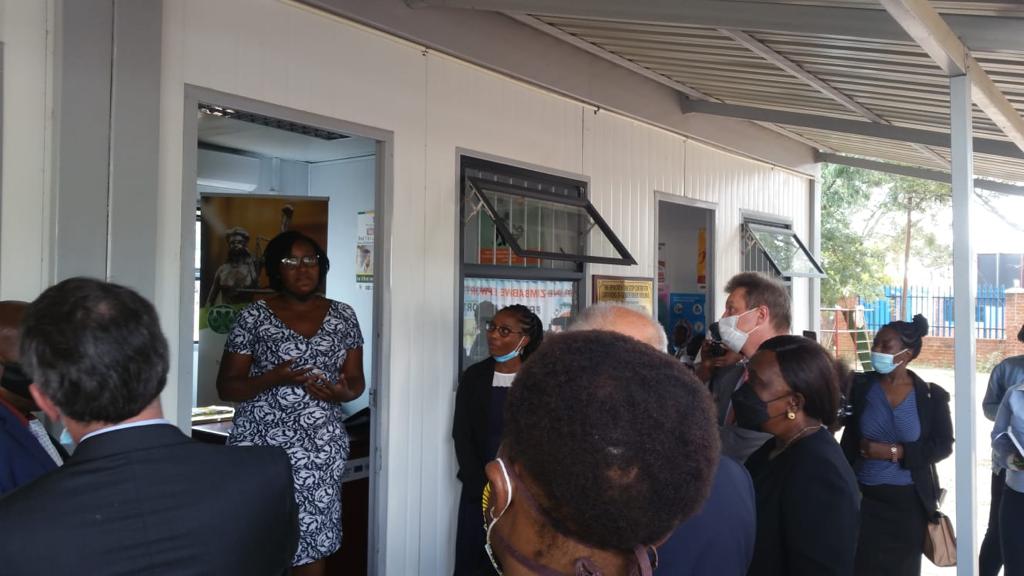
World Bank ZIRP Supervisory Mission - Manicaland
As part of a supervisory visit, a team from the World Bank in Zimbabwe and from Washington DC was in the field to see work on the ground under the Zimbabwe Idai Recovery Project (ZIRP). The mission visited ZIRP programme sites in Chipinge and Chimanimani and interacted with beneficiaries.
Funded by The World Bank, ZIRP is a three-year programme to respond to the devastation left by Cyclone Idai in March 2019. It supports inter-sector post cyclone recovery initiatives, through resilience building efforts in worst affected areas in the context of a humanitarian–development nexus. UNFPA is one of six UN agencies implementing the ZIRP. Under this project, UNFPA through its implementing partners is supporting a component on essential Gender Based Violence service delivery, community surveillance and technical assistance to all ZIRP TAs to mainstream GBV risk mitigation within their respective areas of work.
Gender-based violence is fuelled by the inequalities that exist within communities. Cyclone Idai further exacerbated the risk of exposure to Gender Based Violence. The World Bank support through the ZIRP programme has been key to ensure timely access to essential services for GBV survivors within the Cyclone Idai recovery phase.
One key intervention within the ZIRP is the delivery of GBV services in remote and hard to reach areas, through the mobile One Stop Centre (OSC) model. The model is run by multi sectoral outreach teams, composed of specialized counsellors, paralegal officers, working in close coordination with nurses and police victim friendly units. Provision of mobile OSC services is integrated within the broader mobile clinics model, led by the World Health Organisation or WHO.
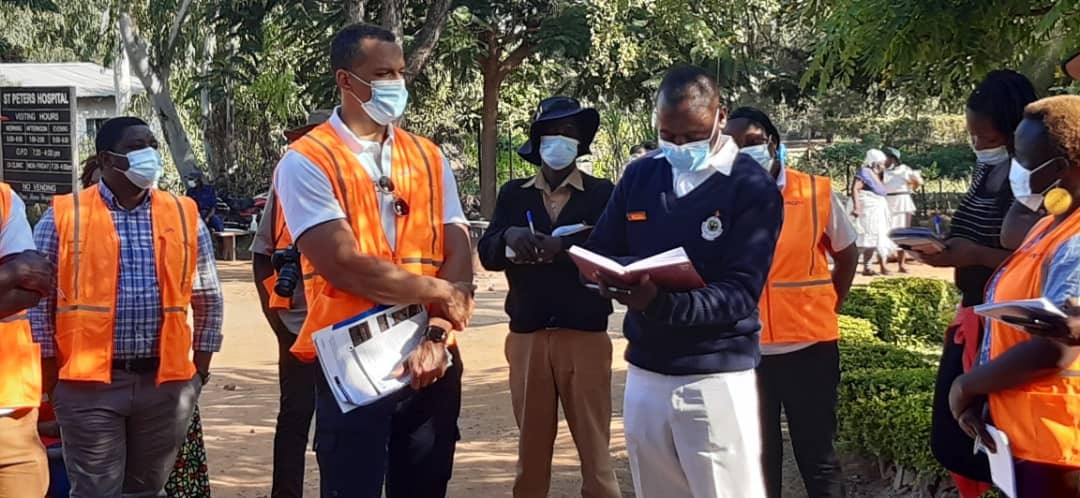
EU heads of cooperation mission - Harare and Mashonaland West
The EU heads of cooperation, other funding partners, Government counterparts and UN heads of agencies visited Harare and Mashonaland West province to see the support being provided by the Health Development Fund (HDF) and other funders such as the Global Fund and the World Bank to the health sector and response to Gender Based Violence. The HDF is a multi-donor pooled funding mechanism supported by the Governments of Britain, Ireland, Sweden and the European Union. The programme is jointly implemented by UNFPA and UNICEF.
As part of the field mission, the team visited the Tariro Clinic and Youth Centre in Hopley in Harare province where UNFPA with the support of HDF is supporting maternal health interventions and

In Mashonaland province, the team visited Chinhoyi Provincial Hospital and Alaska Rural Health Clinic where UNFPA through the HDF is supporting various SRH interventions such as fistula repair surgery, cervical cancer screening and testing, family planning and safe motherhood initiatives. In the same province, the EU Heads of Cooperation visited the Alaska GBV Community Based Shelter, where survivors of GBV are provided with temporary accommodation, counselling and support for any legal processes related to the abuse they experienced. The GBV Shelter in Alaska was set up with the support of EU member states Ireland and Sweden under the GBV 365 National Programme, and has continued to receive support from the EU under the Spotlight Initiative.
“As UNFPA we greatly appreciate the support we have been receiving over the years from our partners that has made and continues to make a difference in the lives of many women and young people,” said UNFPA Country Representative Dr. Esther Muia. “From what we saw on the ground a lot of progress is being made but a lot more still needs to be done to end Gender Based Violence, end maternal deaths and end unmet need for family planning. As UNFPA we remain committed to working with all our partners to achieve this.”
By Bertha Shoko


